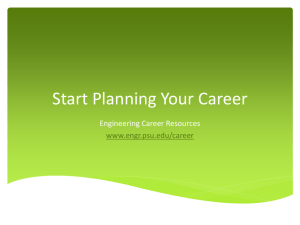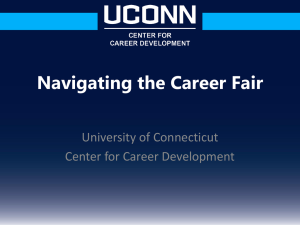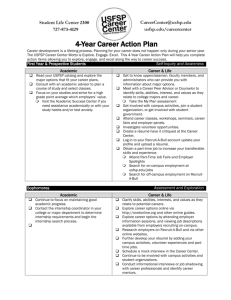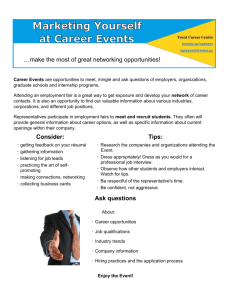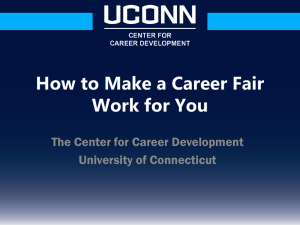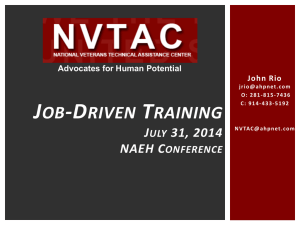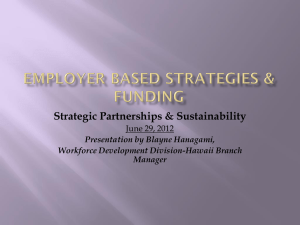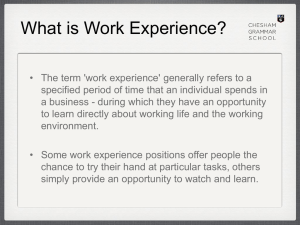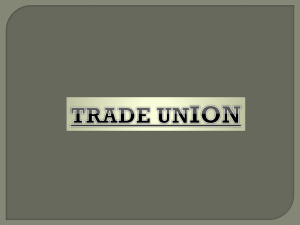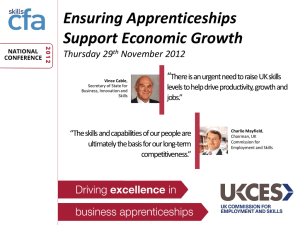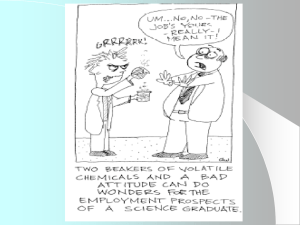eCareer Orientation - Department of Energy and Mineral Engineering
advertisement
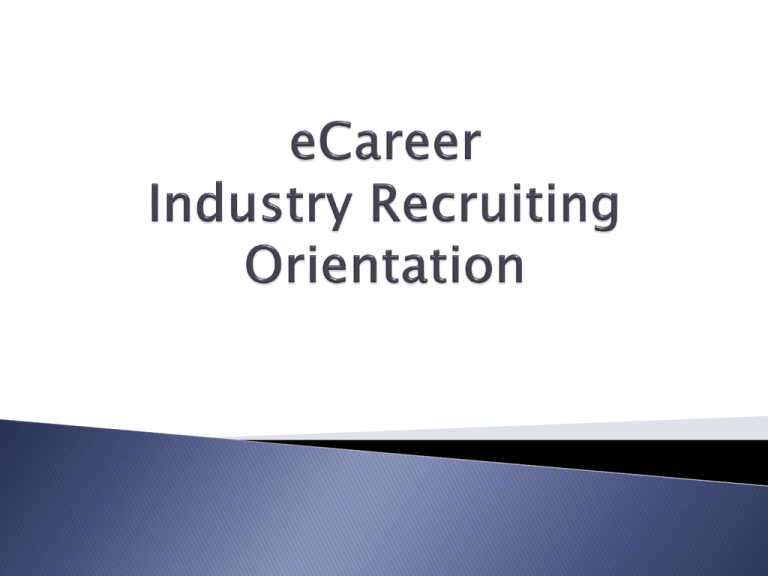
eCareer is a free online job search system that lists available co-op, internship, and entry-level full-time opportunities at hundreds of companies and government agencies across the country and around the world. Job descriptions are posted by employers seeking Penn State students or graduates and are reviewed and pre-approved by our staff to ensure their technical relevance. eCareer is available to all undergraduate and graduate students in the Colleges of Earth and Mineral Sciences and Engineering, as well as recent alums from these colleges. You may use eCareer to view information about oncampus recruiting (interviews), available positions (for employers not coming to campus), and employer information sessions, events, and presentations. Once submitted, students will receive an email in their psu.edu account. This e-mail contains a link to verify e-mail account validity. Students must click the link in the email to move forward in the registration process. Once verification is complete, a second e-mail will be sent to the student that includes log in instructions for future logins. Documents Resume Tips and Examples Heading Include your name, Penn State email address (e.g., abc1234@psu.edu) or other professionally-appropriate email address, phone number, and campus and/or permanent address details. If you have a LinkedIn account and/or a personal website that would be of interest to an employer, include links to those as well. Make sure any web content you link to is professional in content and style. Employers need to be able to reach you by phone. Make sure the voicemail message at the phone number you provide is clear, concise, and professional. Objective An objective statement is not generally necessary (especially if you are submitting a cover letter as well) although, at the request of employers, we require one for all co-op- and internship-seeking résumés submitted through our eCareer job search system. If you are including an objective statement, it should be no longer than two lines and should briefly describe your current goal, including the semester in which you are seeking a position (e.g., "To obtain an internship in energy engineering for summer 2015"). Education List your major or anticipated major, degree or anticipated degree, graduation date or anticipated date, and cumulative grade point average; you may also choose to include your in-major GPA, if desired. Please note that if you are using our eCareer job search system, GPA information is required in order for your résumé to be approved. Also, the official name of this institution is The Pennsylvania State University. If you attend the University Park campus, the official city designation should be University Park, PA (not State College). It can also be helpful to include the names—not course numbers—of 3–6 relevant courses you have taken (e.g., courses related to your field of study or intended career), especially if you have little careerrelated work experience. Work Experience Include all current and past paid positions you have held, including both engineering-related and nonengineering-related positions; include the title you hold/held, the name of the company or organization, location, and months/years of employment. Also, include volunteer positions and student projects, if applicable. Begin each bullet point under each job title with an action word to describe specific responsibilities, and quantify whenever possible (e.g., "Provided assistance to 35 customers"; "Increased customer satisfaction with company procedures, as evidenced on 80 percent of customer surveys between 2013 and 2014"). In general, include no more than five bullet points to describe each position. Do not use pronouns (e.g., "I"). Descriptions of job responsibilities in current positions should be in the present tense (e.g., "Supervise front-line operations"); descriptions of responsibilities in past positions should be in the past tense. International students: When describing previous work experience in your home country, provide additional information about the company that will help to put your experience into context for an American employer who might be unfamiliar with it (e.g., "one of the top marketing companies in Sweden", "second-largest automotive technology company in Germany", etc.). If you don't have much relevant experience (i.e., engineering or technical experience), emphasize the transferable skills that you may have used or developed in non-technical positions you have held. For example, management skills are important to most employers; if you successfully managed a fast-food restaurant, many employers will also conclude that you are capable of managing an engineering project or team. You should make these kinds of connections explicit during any interviews you obtain. Skills Avoid using general, subjective descriptors of your skills (e.g., "good communicator", "hard worker"). Instead, include specific technical skills, including computer programs related to your major that you would use in the position, or special training that would be relevant to the position. Make sure you are reasonably proficient in any program you list as a "skill"—an employer might follow up to see how much you really know! Non-technical skills can be helpful to include as well—for example, include foreign language skills if you have them, especially if you are interested in working overseas. If you are an international student, avoid listing English language proficiency as a skill; employers in the United States will expect you to be proficient in English. Include any experience or training you have had involving leadership or public speaking. Activities, Honors, and Awards Include membership in honor societies or academic, professional, or interest-related organizations. Specify those in which you took a leadership role (if applicable). If you are a first-year student at Penn State, it's okay to include high school activities, clubs, or accomplishments; by the time you are a sophomore, junior, or senior, however, your résumé should include only college-level information. If you have received any academic or professional awards at Penn State or from a previous employer or other source, include these as well. For any award you list, be sure to include information about what the award was for—the name of an unfamiliar award will mean little to employers. References Avoid listing "References Available Upon Request" at the bottom of your résumé; employers who are interested in you will ask for your references anyway. Prepare a reference list, separate from your résumé, that you can provide to employers upon request. Include at least three references with their full contact information, including name, title if available, phone number, email address, and professional relationship to you. For example: John Smith Associate Director, ABC Engineering (Bellefonte, PA) 814-555-1212 johnsmith@abcengineering.com Summer internship supervisor, 2014 References should be current or former employers, professors, instructors, or other professionals. Do not use family members, friends, or significant others as references. Make sure you check with the people you want to use as references and get their permission before putting them on your list! In order to give you the best possible recommendation, references need to be prepared for a potential employer's call. Provide each reference with any necessary job descriptions and a copy of your résumé so he or she will be able to prepare appropriate comments. International Students University Office of Global Programs 410 Boucke Building University Park, PA 16802 814-865-6348 Walk-in hours: Monday, Tuesday, Wednesday: 1:30 – 4:30 pm Thursday, Friday: 8:30 am – 11:30 am http://careerfairs.psu.edu/ Tuesday, Wednesday & Thursday September 16-18, 2014 11:00 a.m. – 4:00 p.m. Bryce Jordan Center Tuesday, Sept. 16: Non-Technical Full-Time Recruiting Day Wednesday, Sept. 17: Internship/Co-op Recruiting Day Thursday, Sept. 18: Technical Full-Time Recruiting Day Suggestion: Instead of handing employers your resume, hand employers a business card. Most employers do not accept resumes during the career fair. Info Session Attire – If you are coming straight from class, jeans or whatever you wore to class is fine. First impressions are key and looking presentable makes a great impression! Interview Attire – Business suits for men and women. If you do not have a suit, wear something clean, pressed, and presentable. Questions ???
